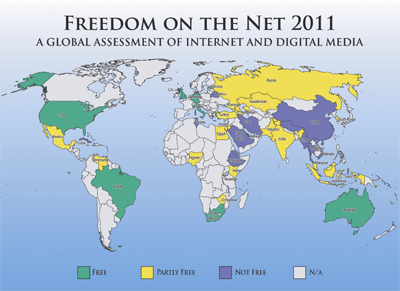- Qualcomm Launches Snapdragon 4 Gen 2 Mobile Platform
- AMD Launches Ryzen PRO 7000 Series Mobile & Desktop Platform
- Intel Launches Sleek Single-Slot Arc Pro A60 Workstation Graphics Card
- NVIDIA Announces Latest Ada Lovelace Additions: GeForce RTX 4060 Ti & RTX 4060
- Maxon Redshift With AMD Radeon GPU Rendering Support Now Available
Internet Freedom Report Released; Ranks Estonia as Best in the World
In a report published by Freedom House, a non-for-profit organization which advocates human rights and political freedoms, we can gain an understanding of which countries have the most open Internet freedoms, and which have no freedoms at all. And no, that’s no typo in the title. Estonia, a small country in Northern Europe with a population barely over 1,000,000, is considered to have the best Internet freedoms on earth.
The 401-page report, entitled “Freedom on the Net 2011”, was authored by researchers Sanja Kelly and Sarah Cook, who based their overall scores on three main pieces of criteria; “Obstacles to Access”, “Limits on Content” and “Violation of User Rights”. An inverted scale is being used here, where the lower the score, the better, out of a possible 100. Estonia, as mentioned earlier, topped the list with a score of 10. The USA came in second, with 13, with Germany in 3rd and Australia in 4th, with 16 and 18, respectively.
After the 4th place, scores begin to jump, with the UK scoring 25, Italy and South Africa scoring 26, and Brazil scoring 29. According to this report, any country with a score of under 30 is considered to be “Free”, so overall, it’s good to be an Internet user in any of the countries mentioned.
It’s not too surprising, but the scores from poorer countries or those with minimal human rights have rather expected scores. India, Nigeria, South Korea and Georgia score under 40, with Jordan, Turkey and Indonesia scoring between 40-50, and Egypt, Zimbabwe, Kazakhstan and Pakistan hovering between 54-55.
Countries with a score of 30-59 are considered to be “partly free”, with 60-100 considered “not free”. Again, as unfortunate as it is, the results here are expected, with countries including China, Cuba, Burma, Saudi Arabia, Vietnam and the worst performer, Iran, which scored 89. Of that, 39 (out of 40) falls into the “Violations of User Rights” category.
The report is a lot to take in, but for anyone who has interest or the time to look through it, I highly recommend it. Each country is broken down in great detail to explain what’s going on there, and why they scored the way they did. After looking through, you’re likely to have a renewed appreciation for being an Internet user in the US (or any “free” country in general).

In order to illuminate the emerging threats to internet freedom and identify areas of opportunity, Freedom House created a unique methodology to assess the full range of elements that comprise digital media freedom. This report examines internet freedom in 37 countries around the globe. The study’s findings indicate that the threats to internet freedom are growing and have become more diverse. Cyber attacks, politically-motivated censorship, and government control over internet infrastructure have emerged as especially prominent threats.




